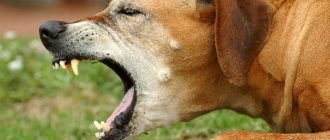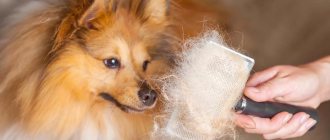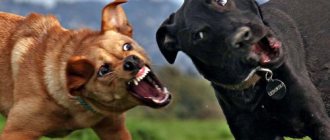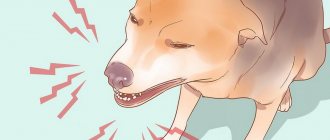Photo by Alvan Nee on Unsplash
The Spitz is a decorative breed that, due to the special anatomy of the nasopharynx, is prone to tracheal collapse and reverse sneezing. Grunting is a common occurrence for a pet, but a preventive examination at a veterinary clinic should be performed twice a year. Only a veterinarian can determine why a Spitz grunts loudly, because the causes of such sounds can be pulmonary, vascular, oncological diseases, or mechanical injuries.
Spitz cough: causes and treatment
An attentive owner always closely monitors the health of the pet. Small changes in behavior or mood are alarming. And a cough will even become a significant cause for concern. Experienced dog breeders know that they cannot delay a visit to the veterinary clinic. The outcome of the disease and the future life of the animal depend on timely diagnosis and treatment. Therefore, if you find any signs of ill health in your dog, hurry to seek qualified help.
What could the disease be?
There are different types of bronchitis in dogs. They differ not only in signs, but also in treatment features, so they must be determined by the veterinarian who examines and diagnoses the animal. These types of bronchitis include:
- Hemorrhagic . It is accompanied by hemorrhages in the bronchial mucosa, so the animal suffers from hemoptysis even outside of coughing attacks. This is the most dangerous form of the disease;
- Fibrinous . The main feature is that cough sputum contains the protein fibrin, which has a gray-yellow tint;
- Catarrhal . An additional sign indicating catarrhal bronchitis is profuse mucous discharge when coughing;
- Putrid . Already from the name it becomes clear that this form of bronchitis is accompanied by a sharp putrefactive odor that occurs against the background of a developing infection;
- Purulent . A characteristic feature of this form of bronchitis is sputum, which contains purulent inclusions.
Causes in puppies
Puppies are most susceptible to kennel cough. Therefore, at the first suspicious symptoms, rush to the clinic. Little Spitz dogs, like children, love to try everything, especially during their shift. Therefore, ingestion of small objects cannot be ruled out.
Some owners, after bathing their puppy, do not dry it properly. A small draft is enough for the baby to get bronchitis or pneumonia. These are quite dangerous diseases that will not go away without rational treatment.
Diagnosis of the disease
It is impossible to make an accurate diagnosis at home, so entrust this task to a specialist at a veterinary clinic. The doctor will examine the dog, ask the owner a few questions and order additional tests.
Basic methods for diagnosing bronchitis:
- listening to the lungs (auscultation),
- tapping the lungs (percussion),
- bronchoscopy,
- radiography,
- blood tests,
- throat swab,
- bacteriological culture.
Based on the research results, the veterinarian makes an accurate diagnosis and prescribes effective treatment that meets all the characteristics of the dog’s body and condition.
The main types and causes of cough in dogs
The cough reflex is protective in nature. Its main purpose is to cleanse the upper respiratory tract of germs, foreign objects, purulent secretions, mucus or other irritants.
Cough as a symptom may indicate the development of completely different diseases. It is necessary to note all the little things that can be noticed in the dog’s well-being. When visiting a doctor, only with the help of a full story from the owner will a specialist be able to collect a primary anamnesis. It is necessary to describe the duration, timbre, strength of cough, time of manifestation and other additional clinical manifestations.
Now let's talk about the main reasons in more detail.
Pneumonia
Pneumonia refers to inflammation of the lung tissue. There are several types of the disease, which depend on the etiology. The main types include: viral, bacterial, fungal, parasitic and aspiration pneumonia. The last one is the most dangerous.
Most often, the disease develops as a complication. In rare cases, the disease manifests itself:
- Unsatisfactory animal maintenance;
- Unbalanced diet;
- Sudden changes in temperature;
- Insufficient drying of the pet's fur after bathing;
- Mechanical injuries of the sternum;
- Inhalation of chemicals that cause lung burns;
- Pulmonary edema.
Main clinical manifestations:
- Cough is the main symptom of respiratory system dysfunction;
- Fever indicates an increase in body temperature;
- Intoxication of the body increases, fatigue, apathy, and refusal to eat develop;
- Dyspnea;
- Difficulty breathing;
- Vomiting reflex;
- Tachycardia.
Therapeutic measures are aimed at combating the infectious agent - eliminating the cause and improving the general condition of the body.
After conducting a set of diagnostic studies, the doctor prescribes appropriate treatment. In case of bacterial contamination, antibiotics will be needed, which are selected taking into account the sensitivity of microorganisms. It is often necessary to combine two drugs that complement each other’s actions. It is not recommended to select medications on your own.
Symptomatic treatment aimed at improving the general condition of the animal is of no small importance. Drugs that reduce fever, painkillers, immunomodulators, vitamin and mineral complexes are used. “Neglected” patients are recommended to be treated in a hospital. They are given medications intravenously along with drips.
Cordial
Cough often accompanies heart failure. The heart increases in size and puts pressure on the trachea, causing a cough reflex.
Distinctive characteristics:
- Deaf;
- Dry, without phlegm;
- Painful, prolonged attacks;
- Reduced performance;
- Shortness of breath, apathy.
Dilated cardiomyopathy is a disease characterized by dilation of the heart cavities. This is one of the reasons for the development of cardiac cough. The main function of the body's main muscle is to pump blood. When this function is impaired, deficiency develops. German Spitz dogs with cardiomyopathy grunt, wheeze, and cough. The disease is treatable only in the early stages.
Parasitic
The risk of parasite infection increases in dogs that live for a long time in unsanitary conditions and without proper treatments. The main types of endoparasites that affect the respiratory organs are toxacara and hookworm.
A dog becomes infected by swallowing an adult helminth or its larval form. Inside the body, parasites migrate with the bloodstream, reaching their destination – the lung tissue. Tracheobronchitis develops, causing paroxysmal coughing.
Modern doctors talk about the peak incidence of dirofilariasis in dogs. Infection occurs through a mosquito bite. The lungs and cardiac system are affected. A moderately wet cough develops, worsening when lying down.
Treatment boils down to deworming and increasing the body's defenses.
Allergic
An allergic cough is accompanied by sneezing, cyanosis of the mucous membranes, copious discharge from the eyes, and skin rashes. The reason is contact with an allergen. This could be food, plants, chemicals or parasite treatments.
Therapeutic measures are aimed at eliminating the allergen and improving the general condition of the animal.
Oncological
One of the clearest symptoms of lung cancer is a persistent cough. Sputum contains dead tissue cells. There is difficulty breathing, shortness of breath, and fatigue. Adenocarcinoma is the most common disease among dogs. Cancers are difficult to treat and often result in death. Maintenance therapy is reduced to the use of drugs that dilate the bronchi and relieve spasms.
Entry of foreign bodies
The entry of a foreign object into the respiratory tract is a consequence of impaired swallowing. This occurs when the central nervous system is disrupted, for example, with rabies, or when eating food quickly. A foreign object entering the respiratory tract or lungs causes an inflammatory process. The animal begins to cough, often with bloody sputum. The attacks are accompanied by suffocation and wheezing; they occur periodically and often lead to vomiting.
The only correct solution if a foreign body gets into the respiratory tract is to urgently consult a doctor so that he can remove the object using an endoscopic device.
The surgery is performed in a veterinary clinic under general anesthesia. Further treatment consists of the use of antibiotics to help relieve the inflammatory process.
Tracheal collapse
Miniature Spitz dogs are more susceptible to tracheal collapse. The disease is difficult to completely cure, but it can be controlled. The disease is inherited and is associated with flattening of the tracheal rings. Instead of being O-shaped, they are C-shaped. The rigidity of the rings decreases, the friction of the posterior and lower walls of the trachea increases, which causes coughing. The attacks are accompanied by suffocation and wheezing.
The doctor makes the diagnosis based on radiography.
So why do Pomeranians cough so much?
The main reason why a Pomeranian may cough repeatedly is because he has a collapsed trachea. This occurs when there is damage or degradation of the cartilage that supports his trachea. Other causes may include: lung infections, allergies and kennel cough.
No Pomeranian parent should ever be forced to mercilessly watch their dog cough, because this would feel like torture by the Pomeranian and his owner.
When you have a Pomeranian, it's important to know what actions you can take when this common health problem occurs, so it's vital that you have all the information you need to deal with the problem as soon as it starts.
Beware of cases where you observe your Pomeranian constantly coughing (especially if he makes a loud buzzing sound), panting heavily, or choking on vomit after eating or drinking, then the following list of medical problems may be the cause.
When I see one or more of my Pomeranians choking, coughing, or something similar, my mind races as I try to identify and solve the problem.
© shutterstock
In the case of Spitz and many other small dog breeds, the most likely solution is tracheal collapse. However, other health problems may present with similar symptoms.
Constant, at night and not only
A constant cough with intensification and severe snoring and snoring at night is a consequence of brachycephalic syndrome , characteristic of dogs with a shortened skull, such as the Spitz.
This is the so-called “soft palate” condition . The soft palate in the back wall is so long that it reaches the respiratory tract, resulting in snoring and coughing. A Spitz may begin to snore and have a specific cough from 3-4 months, and it may get worse in warm, humid weather.
Like I was choking
Often the dog coughs as if he was choking on something after a long walk or meal. The Spitz seems to be trying to cough up a foreign object from its throat. It is worth making sure that the dog has not really choked on a foreign object or piece of food - look into the mouth.
When breathing is compressed by a foreign object, the dog runs, fusses, and begins to salivate. Vomiting may begin. If this factor is excluded, you need to look for other reasons.
It is worth noting here that small breed dogs tend to have a constant cough when they are nervous. This is due to the fact that the cartilages of the Spitz's larynx have an open ring shape and cause spasm. This can happen while eating or actively moving.
It is necessary to calm the pet, pet it, pick it up or give it water to drink.
Stroking the throat from top to bottom using gentle, smooth movements will also help. Important! A smoking owner should prevent their pet from inhaling tobacco smoke.
Can you help yourself?
What to do if your dog often sneezes and snorts depends on the cause of the illness and the severity of the condition. Without visiting a doctor, you can manage on your own if you have a mild cold or a foreign body.
To help your pet recover from a cold, take care of its comfort. Keep the patient warm, remembering to regularly ventilate the room. Limit physical activity and walking time. Give more fluids, including rosehip infusions, and change your diet in favor of easily digestible foods. If there are no complications, the existing symptoms will go away on their own in a couple of days.
If you suspect an object is stuck, calm your pet and carefully examine his nostrils. If the location of the stuck blade of grass allows it to be removed without harming the animal, pull it out using clean fingers or tweezers treated with an antiseptic. If it is deep or has sharp edges, it is best to consult a veterinarian.
Proper animal care
The first step is to provide warmth and rest to a dog suffering from bronchitis. To do this, provide your pet with a comfortable and dry place to sleep in a heated room. The veterinarian gives recommendations on nutrition individually, but in any case you will need easily digestible food with multivitamins. If natural food is used, it should be soft and warm. Walking in bad weather should be kept to a minimum. All treatment prescribed by a specialist must be strictly followed. It is impossible to interrupt therapy, even if the symptoms of bronchitis disappear.
By following these simple recommendations, you will ensure a quick recovery for your dog!











